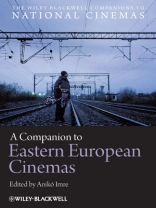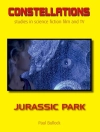A Companion to Eastern European Cinemas showcases
twenty-five essays written by established and emerging film
scholars that trace the history of Eastern European cinemas and
offer an up-to-date assessment of post-socialist film
cultures.
* Showcases critical historical work and up-to-date assessments
of post-socialist film cultures
* Features consideration of lesser known areas of study, such as
Albanian and Baltic cinemas, popular genre films, cross-national
distribution and aesthetics, animation and documentary
* Places the cinemas of the region in a European and global
context
* Resists the Cold War classification of Eastern European cinemas
as ‘other’ art cinemas by reconnecting them with the
main circulation of film studies
* Includes discussion of such films as Taxidermia, El
Perro Negro, 12:08 East of Bucharest Big Tõll, and
Breakfast on the Grass and explores the work of directors
including Tamás Almási, Walerian Borowczyk, Roman
Polanski, Jerzy Skolimowski, Andrzej u³awski, and Karel
Vachek amongst many others
Tabela de Conteúdo
Notes on the Editor and Contributors viii
Foreword xv
Dina Iordanova
1 Introduction: Eastern European Cinema From No End to the End
(As We Know It) 1
Anikó Imre
Part I New Theoretical and Critical Frameworks 23
2 Body Horror and Post-Socialist Cinema: György
Pálfi’s Taxidermia 25
Steven Shaviro
3 El perro negro : Transnational Readings of Database
Documentaries from Spain 41
Marsha Kinder
4 Did Somebody Say Communism in the Classroom? or The Value of
Analyzing Totality in Recent Serbian Cinema 63
Zoran Samardzija
5 Laughing into an Abyss: Cinema and Balkanization 77
Kriss Ravetto-Biagioli
6 Jewish Identities and Generational Perspectives 101
Catherine Portuges
7 Aftereffects of 1989: Corneliu Porumboiu’s 12:08 East of
Bucharest (2006) and Romanian Cinema 125
Alice Bardan
8 Cinema Beyond Borders: Slovenian Cinema in a World Context
148
Meta Mazaj and Shekhar Deshpande
Part II Historical and Spatial Redefinitions 167
9 Center and Periphery, or How Karel Vachek Formed a New
Government 169
Alice Lovejoy
10 The Polish Black Series Documentary and the British Free
Cinema Movement 183
Bjørn Sørenssen
11 Socialists in Outer Space: East German Film’s Venusian
Adventure 201
Stefan Soldovieri
12 Red Shift: New Albanian Cinema and its Dialogue with the Old
224
Bruce Williams
13 National Space, (Trans)National Cinema: Estonian Film in the
1960s 244
Eva Näripea
14 For the Peace, For a New Man, For a Better World! Italian
Leftist Culture and Czechoslovak Cinema, 1945-1968 265
Francesco Pitassio
Part III Aesthetic (Re)visions 289
15 The Impossible Polish New Wave and its Accursed
Émigré Auteurs: Borowczyk, Polañski, Skolimowski,
and u³awski 291
Michael Goddard
16 Documentary and Industrial Decline in Hungary: The
‘Ózd Series’ of Tamás Almási 311
John Cunningham
17 Investigating the Past, Envisioning the Future: An
Exploration of Post-1991 Latvian Documentary 325
Maruta Z. Vitols
18 Eastern European Historical Epics: Genre Cinema and the
Visualization of a Heroic National Past 344
Nikolina Dobreva
19 Nation, Gender, and History in Latvian Genre Cinema 366
Irina Novikova
20 A Comparative Study: Rein Raamat’s Big Tõll and
Priit Pärn’s Luncheon on the Grass 385
Andreas Trossek
21 The Yugoslav Black Wave: The History and Poetics of Polemical
Cinema in the 1960s and 1970s in Yugoslavia 403
Greg De Cuir, Jr .
Part IV Industries and Institutions 425
22 Follow the Money – Financing Contemporary Cinema in
Romania 427
Ioana Uricaru
23 An Alternative Model of Film Production: Film Units in Poland
after World War Two 453
Dorota Ostrowska
24 The Hussite Heritage Film: A Dream for all Czech Seasons
466
Petra Hanáková
25 International Co-productions as Productions of Heterotopias
483
Ewa Mazierska
26 East is East? New Turkish Cinema and Eastern Europe 504
Melis Behlil
Index 518
Sobre o autor
Anikó Imre is an Associate Professor of Critical
Studies at University of Southern California School of Cinematic
Arts. Her books include East European Cinemas (2005);
Transnational Feminism in Film and Media (co-authored with
Katarzyna Marciniak and Áine O’Healy, 2007); Identity
Games: Globalization and the Transformation of Media Cultures in
the New Europe (2009); and Popular Television in Eastern and
Southern Europe (co-authored with Timothy Havens and Kati
Lustyik, 2011). She is also co-editor of the Global Cinemas
book series.












